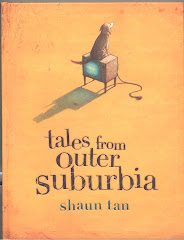The most talented authors working in the genre of historical fiction have the gift of making history come alive for young readers. My own early experience with the genre centred on the books of British author Geoffrey Trease: Word to Caesar was a particular favourite. Key to this task is the creation of a compelling central character (think Karen Cushman's heroines or the young boys taking centre stage in the books of Christopher Paul Curtis), who can draw readers into a personal story, set against a backdrop of historical tension.
Private Peaceful, by Michael Morpurgo [UK]
HarperCollins, 2003 ISBN: 978-0-00-715007-6 185 pages
After a pastoral boyhood in the English countryside, 16-year-old Tommo Peaceful, devoted younger brother to Charlie, finds himself counting down the minutes in the filthy, sodden, trenches of Ypres. As we relive the crucial moments of Tommo's life, readers develop an empathetic understanding of the complex relationship between the brothers.
Morpurgo is an extremely successful, prolific,and well-regarded author, with a gift for evoking the reader's sympathy for his characters. However, there is a lack of meaningful character development, and character conflict seems so obvious as to be part of the backdrop -- it is difficult not to see the Peaceful brothers as innocent lambs for the slaughter rather than credible personalities. Morpurgo's use of detail in setting particularly is rich and evocative, yet lacks immediacy: the whole story seems to unfold in two dimensions only. Class conflict, especially, is under-developed as a theme. Despite the use of time-referenced flashbacks as a framing device, plot here is linear, and easy to follow. As an insight into the horrors of war, the novel provides enough detail to illustrate, but not to horrify. In fact, almost 2/3 of the story unfolds before the Peaceful boys arrive in Belgium, and the novel may simply be too slow for many young readers.
The novel is recommended by ERAC for students in grades 10 and 11.
The Red Necklace, by Sally Gardner [UK]
Orion, 2007 ISBN: 978-1-84255-634-4 371 pages
Yann Margoza is a gypsy boy with the gift of reading minds, coming of age in a Paris galvanized by revolution, and soon to be shattered forever by the Terror. Drawn into a web of blackmail and coercion, Yann finds himself faced with a sinister antagonist, Count Kalliovski, who is intent on pulling a beautiful young aristocrat into his deadly clutches. Can Yann and his beloved Sido flee to their allies in London before the guillotin falls?
Gardner is a fairly prolific British author, and this in one of her strongest books. The plot dances along, and is simple, yet intriguing, enough, to allow readers ready engagement. Detail is vivid -- even gruesome at times -- and spikes curiosity about the historical period. As a class or small-group novel, there is obvious potential for research and extension activities. Characters are appealing, although not particularly well-developed, and the atmosphere of mystery deepens through the novel. My only complaint is that the ending, clearly set up to allow for a sequel, is abrupt and unsatisfying. An excellent entree to depth study of the French Revolution. Recommended by ERAC for Grade 9 students.
Queen's Own Fool, by Jane Yolen [US]
Penguin 2000. ISBN: 0-698-11918-5 390 pages.
At the beginning of this lengthy novel, Nicola, later nicknamed La Jardinere, is a member of a troupe of wandering actors, starving on the French backroads in the middle of the 16th Century. Good fortune forces an introduction to the young French queen, otherwise known as Mary, Queen of Scots. Nicola's quick wit and loyalty to the Queen take her from France to Scotland, through times of celebration and times of peril, until the young "fool" is finally able to gain her freedom and true love.
Yolen writes with clarity and a precise eye for detail. Characters are credible, and the narrative, although protracted, is easy to follow. Actual historical events are described, and readers might gravitate to extension research activities. The main character, and narrator, Nicola tells her story with humour and some maturity, but some readers may find themselves unable to follow the novel through the several years of action it describes. Recommended by ERAC for Grade 9 students.
Subscribe to:
Post Comments (Atom)

No comments:
Post a Comment